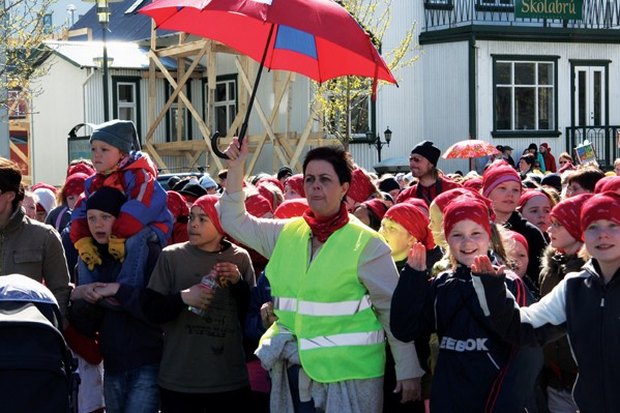
The vanguards of Iceland? School-children participate in the opening of the Reykjavik Arts Festival.
Photo: Odd Iglebaek
It was after their electoral victory on the 23rd of May 2007 that the chairman of the Independence Party, Prime Minister Geir H. Haarde, and the chairman of the Social Democratic Alliance, Ingibjörg Sólrún Gísladóttir, published the policy statement quoted above. The occasion was that the two largest parties in the country had negotiated a political ceasefire, and together they plan to govern the country for the coming four years. – I think most people received this news with relief, comments Dennis Johannesson, a Reykjavik-based architect and sometime political activist.
Together the new government has 43 of the 63 seats in the Altinget, the Icelandic Parliament. – Therefore they constitute a clear majority, and thus have the ability to really achieve things, if the political will is there, adds Johannesson.
How low is low?
The new government's initial policy statement draws attention first and foremost to economic policy. In the country both spending and investment are high, but what worries many is that the Central Bank has responded to this by maintaining headline interest rates at around 15 %. Thus export-industries with high levels of domestic costs, such as for example the fishing industry, find it increasingly difficult to maintain profit levels in international markets. Similarly, household with short-term loans, face growing problems in meeting their borrowing requirements. The government is well aware of the debate, and therefore clearly states that they "aim" is to keep interest rates "low". The problem is however that is it rather difficult to pin down exactly how low 'low' is. In fact no figures are given.
In order to sustain the substantial growth the country has experienced in recent years the government makes it very clear that "expansion abroad" is central to maintaining Iceland's high standard of living. They also say that they want to create "optimum conditions" to assist Icelandic companies in their quest for international expansion. They state that Iceland's business sector will be increasingly knowledge-based, and that cooperation between industry and Iceland's universities is the key to improved business performance and innovation.
On the whole, the government seems keen to support a wide variety of trades and industries. Culture and the arts are also mentioned specifically. Similarly there are plans to boost the hi-technology sector.
In respect of Iceland's more traditional trades and businesses the government notes that a review of the agricultural system will be undertaken with the aim of liberalizing it, improving the position of farmers and reducing prices to consumers. Regarding fisheries a study will be made of the experiences reported to date of quota systems.
Nourish the banks!
In recent years Lansbankinn, Glitnir and Kaupthing Bank, the largest banks in Iceland, have all gone international and have apparently done very well. The impression here is that it is very popular among politicians as well as the media to mention this, particularly to foreigners: – See what they have achieved, in London 2000 people are now working in Icelandic Banks, a senior parliamentarian from the Independence Party, underlined to your correspondent. The new government also states that they will try to ensure that "companies expanding abroad will continue to realise the benefits of being headquartered in Iceland."
Are they afraid of the opposite? Perhaps, at least we are told that: – It is for this reason that we have decided to create a double data-link system to the continent. We need two. To have one in reserve, so that the banks do not risk loosing their market-contacts, explains Einar Karl Haraldsson. He is the political advisor to the Social Democratic Alliance's Össur Skarphéöinsson, the new Minister of Industry. – Approaches from Yahoo and Google to establish major servers in country make such investments interesting, Haraldsson adds.
Interestingly enough, in the governmental declaration, the new submarine cable is not to be found in the chapters dealing with business and economics. Rather it is under "Harmonised residence and employment", the regional paragraph. Here it is also stated that it is not only the banks, but "everyone in Iceland" that should "be allowed the opportunity to take advantage of the revolution in data transmission".
Spreading public jobs?
The regional chapter also underlines the fact that public sector work that can be performed irrespective of place of residence "shall be identified". Improved transport is necessary in order to achieve demographic balance and reduce transport costs.
As for most governments proposals to reduce taxes are popular. In Iceland, there are several suggestions in this respect. Our guess is that at the very least the one on higher personal tax-free allowances will be implemented.
There are special chapters on more "Focused Government administration" as well as one on a "Child-friendly society".
Vanguard also in education...
Turning to education, the government once more turned to the "vanguard internationally" goal. It is also interesting to note here that more emphasis will be placed on freedom of choice for students and individually-based study programmes. Among other things the goal here is to reduce the secondary school drop-out rate. Artistic and vocational training will also be stepped up at all levels of schooling.
In respect of international politics it is also worth noting that the new government "regrets the conflict taking place in Iraq and wants to contribute to peace in Iraq and the Middle East." While in concrete terms Iceland has specifically mentioned that it hopes to contribute through midwife-assistance to the area.
Finally the government states that: "Iceland should aim for leadership in the campaign against marine pollution and in global work to counter climate change."
The government does not promote, or expect to see, changes in Iceland's relationship with the European Union.
More info at: http://eng.forsaetisraduneyti.is/news-and-articles/nr/2646 or www.mfa.is
By Odd Iglebaek